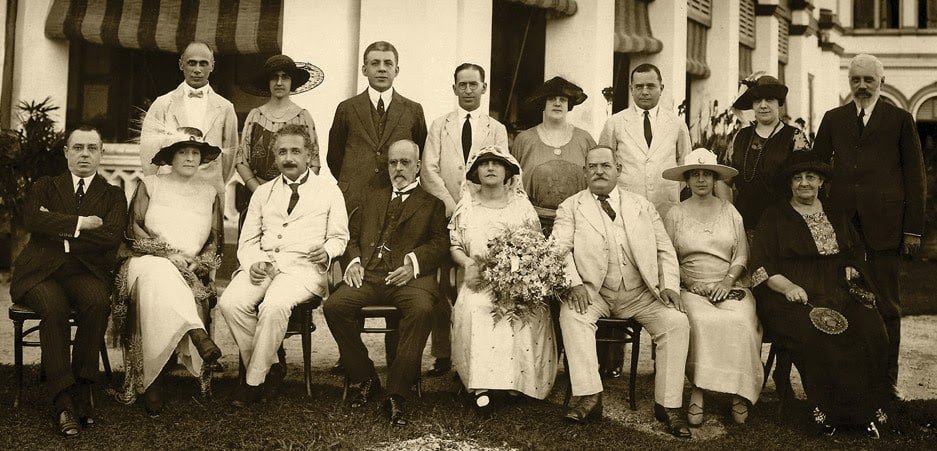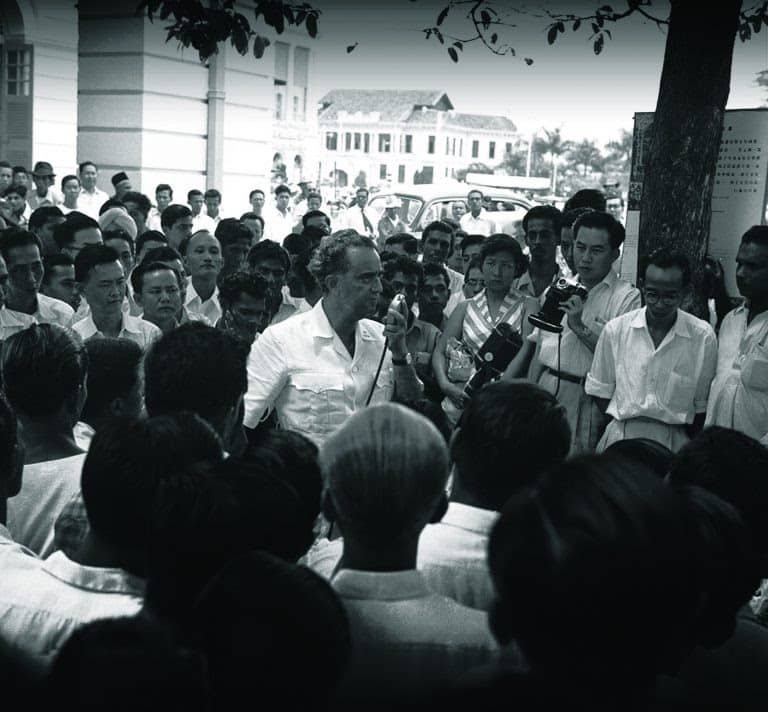
The American Sephardi Federation’s Sephardi Ideas Monthly is a continuing series of essays and interviews from the rich, multi-dimensional world of Sephardi thought and culture that is delivered to your inbox every month.
The January, 2023, issue of Sephardi Ideas Monthly inaugurates a new series exploring 19th and 20th c. Jewish history in South and East Asia. The series’ horizons, however, will not be solely historical. Our exploration will also stop to reflect upon the relevance of recent Asian Jewish history for present-day concerns and from a variety of contemporary perspectives. Along the way, we’ll hear from writers, scholars, and public figures from across the Asian continent. But in order to frame what’s ultimately at stake in this investigation, we’ll begin in an unexpected place: Israel’s Government Yearbook.
From 1949-61, David Ben Gurion composed the preface to an annual, hard-copy “State of the Nation,” and in his 1952 preface, Israel’s first Prime Minister noted “two exceptional portents of our times.” The first was “the struggle for leadership of the world between two mighty powers, the United States and the Soviet Union.” In this struggle, Ben Gurion wisely bet on America’s success.
The second portent was “the waning hegemony of Europe and the rise of Asia.” In Ben Gurion’s view, Israel’s future flourishing depended on its capacity to also see itself as part of an Asian order:
The Homeland of the Jewish people stands upon the western edge of Asia… After two thousand years of wandering and dispersion, it is returning to its ancient Homeland in western Asia… Less than all peoples may the people of Israel shut its eyes to the rise of Asia and its peoples.
Why was the Asian context so important? Ben Gurion believed that Asia possessed a cultural vitality that was lost to Europe:
It has been enjoined upon the Jewish people, now settling again in its ancient Homeland, to know all the intellectual and cultural treasures of the peoples of Asia – Arabia, Persia, and Japan, but first and foremost India and China. In books on general history, and especially in those devoted to the history of literature and of human thought, Japan, China and India rarely find mention. This lacuna is due to the pridefulness of Europe… whose time has passed.
As for Israel:
Our people is commanded to take unto itself all the spiritual treasures of humanity, all those glittering qualities of the spirit which made the people of Israel in biblical times a teacher of mankind.
In order to understand Ben Gurion’s call for cultural receptivity, it’s important to remember that the Zionist leader saw an intimate connection between cultural and political vitality. Deeper than any political form or ideology, Ben Gurion believed that culture in its profound sense, “spiritual treasures,” provide essential energy for political communities.
The geo-political realities of “non-aligned” politics deferred the realization of Ben Gurion’s vision, but China’s growth, India’s development and the increasing strength of other “Asian Tigers” over the past few decades have demonstrated Ben Gurion’s prescience. And once circumstances permitted, Israeli governments began to realize the economic and diplomatic dimensions of Ben Gurion’s vision of Asian integration. Meanwhile, Jewish communities are flourishing in Dubai, Singapore, and Hong Kong, and even the Abraham Accords can be seen, for the parties concerned, as part of this broader trend of regional connectivity.
In this context, as the State of Israel, Jewish communities and individual Jews increasingly establish networks of connections across Asia and stand poised to play an important role in 21st c. Asian life, it’s worthwhile stepping back and remembering that the Jewish people were not complete strangers to 20th c. Asian history. A small but important chapter of 20th c. Jewish history actually played out in South and East Asia. To be more precise, from India to Singapore to China, Baghdadi Jews and Baghdadi Jewish communities – the Baghdadi diaspora − played significant roles in local business, politics, and culture. And as we’ll see at the conclusion of the series, for a brilliant but brief moment during the 1920s in Shanghai, Baghdadi Jews provided a home for a cosmopolitan, Sephardi form of Judaism from Ottoman Jerusalem. Their Judaism embodied the receptivity to Asian culture that, a generation later, Ben Gurion would envision in his preface to the Government Yearbook.
We begin the series this month in Southeast Asia with Dawei Wang’s original contribution to Sephardi Ideas Monthly, a wonderfully-written and richly-documented article, “From Zionism to Self-Rule: Singapore’s Baghdadi Jews.” Dawei Wang is a freelance journalist based in London and Athens who received his MPhil in Modern Middle Eastern Studies from the University of Oxford. This month’s essay is an adaptation of a chapter from Wang’s top-notch, Oxford thesis.
Wang sets the stage with the founding of Singapore in 1819 and the arrival of the Baghdadi Jews in the 1860s. His focus soon turns, however, to the political energies of the city-state’s Baghdadi Jews. Those energies were channeled in two directions: the Zionist project and Singapore’s independence.
Albert and Elsa Einstein (third and second to the left, first row) with the Baghdadi Jewish notables in Singapore, November 1922
(Photo courtesy of Dawei Wang/Singapore Women’s Hall of Fame)
In telling the story of Baghdadi Zionism in Singapore, Wang introduces a central character, “Manasseh Meyer, community patriarch and president of the Singapore Zionist Society.” Wang notes how:
Meyer’s strong commitment to the upkeep of Jewish institutions in the Holy Land was animated by the teachings of the esteemed Baghdadi Rabbi Yosef Hayyim Ben Elijah (known as the ‘Ben Ish Hai’). Meyer developed a close personal relationship with the rabbi and had been endowing religious institutions in Palestine since the 1880s. In 1900, he took his wife and seven children to Jerusalem to ‘inculcate in them a love for Israel.’
Wang then follows the trail of Zionist representatives, including Albert Einstein, who, upon arrival in Singapore, visited Meyer’s “white palatial residence, from which extended ample wings.” Wang also delineates the role played by Meyer’s talented daughter, Mozelle Nissim. As he delineates in impressive detail, the history of Baghdadi Zionism in Singapore was in large part a history of material support, with Meyer offering large sums in support of Jewish settlement in the Land of Israel and, as such, setting an example for the community as a whole.
After tracing the fortunes of Baghdadi Zionism in Singapore, Wang turns his attention to Jews who decided to invest in Singapore’s future. In particular, he examines the remarkable figure of David Saul Marshall.
A Singapore-born Baghdadi Jew who edited a local Jewish newspaper before serving as a soldier in defense of Singapore, during WWII David Marshall was “interned at Japanese labor camps” where he “suffered malnutrition, dysentery, and malaria.” After the war, Marshall enjoyed a career as a prominent criminal lawyer and political activist in Singapore before ultimately serving as Chief Minister of Singapore’s first elected government. He resigned his position in 1956 but continued to practice law and participate in politics before serving as Singapore’s Ambassador to several European countries. Today, a bust of Marshall sits at the entrance to the Yong Pung How School of Law at Singapore Management University.
Singapore’s First Chief Minister, David Marshall, speaking at a campaign rally in 1956 (Dawei Wang/BiblioAsia)
Next month’s issue of SIM will feature an interview with Wang, subsequent issues will include a fascinating range of perspectives on Baghdadi (and Sephardi) history in South and East Asia, and we’ll conclude with a remarkable story of Classic Sephardi Judaism and intercultural exchange in Jazz-Age Shanghai.
Sephardi Ideas Monthly is very happy to inaugurate our new series expanding and advancing the exploration of modern Jewish history in Asia with Dawei Wang’s essay, “From Zionism to Self-Rule: Singapore’s Baghdadi Jews.”
Additional Reading and Viewing:
“Zionism and Asia’s Baghdadi Jews”: Dawei Wang provides an overview of “the lesser-known story of the Baghdadi Jewish merchant diaspora in Asia during the colonial era and their involvement in the Zionist movement.”
“Between Baghdad and Asia with Dr. Sasha Goldstein-Sabbah”: Prof. Sasha Goldstein-Sabbah, the author of Baghdadi Jewish Networks in the Age of Nationalism (Brill, 2021), sits down with Dr. Drora Arussy from the ASF’s Institute for Jewish Experience to talk about “the history of Baghdadi Jews in Asia from its earliest beginning until the present day, exploring the relevance of these communities both to Baghdad and the larger Jewish world.”
Please see below for more information regarding the ASF IJE Exclusive Authors Series with Joseph Sassoon on 7 February at 12PM ET. Sassoon, the al-Sabah Chair in Politics and Political Economy of the Arab World at Georgetown University and a Senior Associate Member at St. Antony’s College, Oxford, will discuss his new book, The Sassoons: The Great Global Merchants and the Making of an Empire.
——————————-
American Sephardi Federation | http://www.AmericanSephardi.
update subscription preferences
 eSefarad Noticias del Mundo Sefaradi
eSefarad Noticias del Mundo Sefaradi



